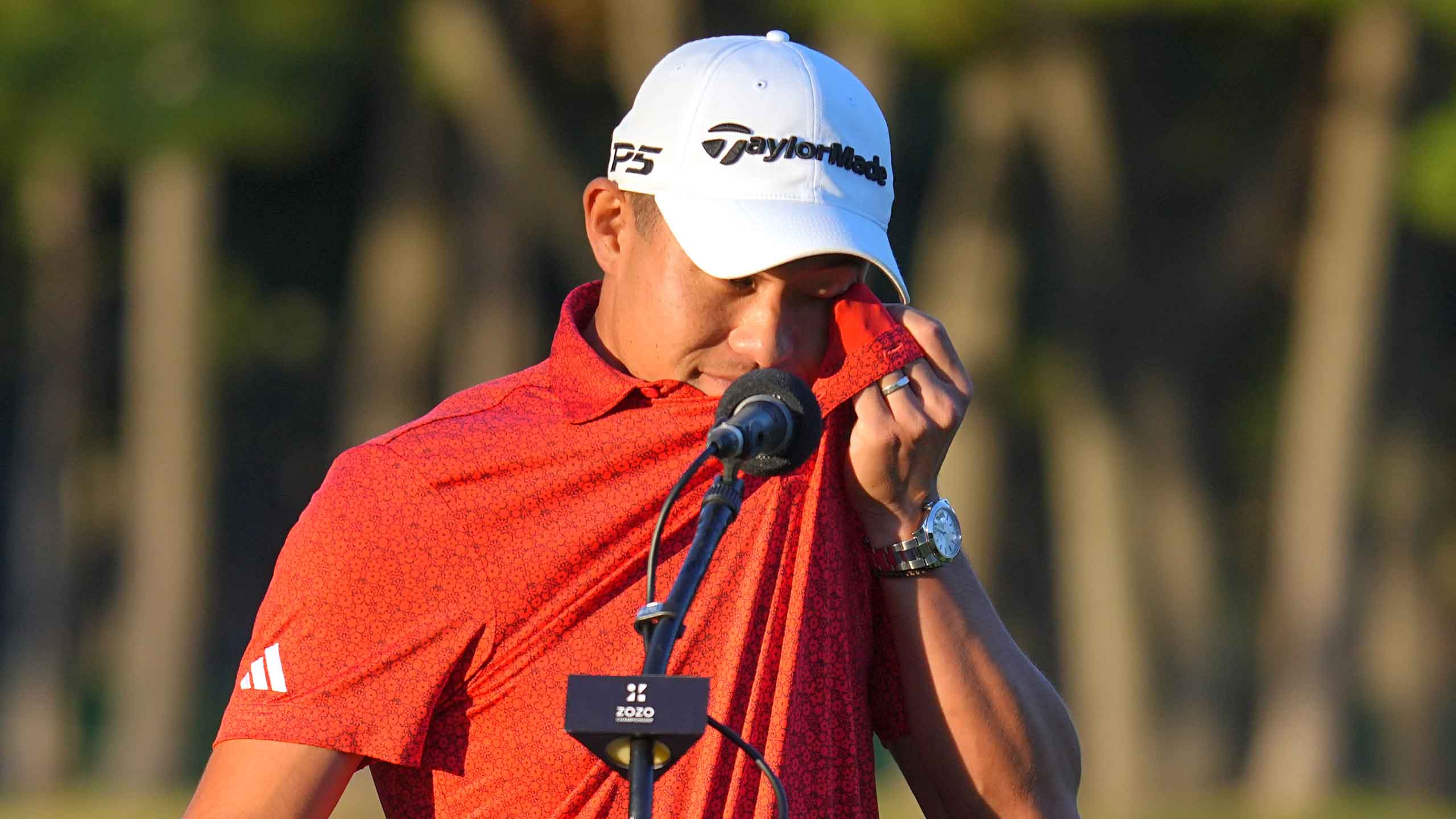It’s been a while since we’ve seen this side of Collin Morikawa.
Before Sunday’s trophy celebration at the Zozo Championship, Morikawa had gone more than two years without tasting a victory on the PGA Tour. He’d battled through swing changes and strange misses and a balky putter. He’d watched his World Ranking dip and his status fall off.
And so as he addressed the crowds in Japan, where he claims half of his cultural heritage, he started to cry. The weight of the moment had finally set in, and it meant more than almost anyone knew.
Once upon a time, Morikawa had raced onto the scene in pro golf, collecting five wins and two majors in two abbreviated years to start his career. He was an overnight prodigy, a superstar in the making. His game earned fast comparisons to legends of the sport, including his idol, Tiger Woods.
The logic was sound enough. Morikawa was one of the best ball-strikers pro golf had seen in a long time. His game was steady and precise in an unusual way — the kind that seemed to lend itself to cold-blooded performances in pressure-packed moments, like the ones he’d had at the PGA in 2020 and the Open Championship in 2021. (He’d recorded victories in his first start in both of those majors, and he’d come close in his first starts at both the U.S. Open and the Masters.)
For a while, it seemed Morikawa was this way, too: confident and self-assured, unflappable in the face of controversy. His certainty with a 6-iron seemed to radiate into the other folds of his life, presenting the image of a modern, squeaky-clean superstar.
But then something interesting happened: Morikawa came back to earth. His putter left him first. Then his driver. Then his shot-shape. Each time it seemed he’d figured one thing out, something else fell into disarray.
His consistency, once the calling card of his professional skillset, evaporated. He vacillated wildly between top-5 finishes and missed cuts. He struggled in clutch moments. In one particularly difficult memory, he blew a six-stroke lead on Sunday at the Sentry Tournament of Champions to Jon Rahm, losing the tournament without even forcing a playoff.
On the outside, Morikawa was unchanged. He spoke openly about needing to get better, but only in the same guarded platitudes he’d used for most of his playing career. He told interviewers he was optimistic about re-finding the magic touch. He never let on that his struggles had been anything more than an unfortunate detour from the arrow-straight autobahn he’d lived his entire life.
“This year’s been fairly stressful, a little frustrating at the same time,” he said late last year. “But that’s why I come to these tournaments, to come out here and play well and hopefully win.”
But of course there was a lot more happening under the hood. How couldn’t there be? And on Sunday at the Zozo Championship, Morikawa finally let us in for long enough to see it.
It all came together for Morikawa on Sunday, who shot a final-round 63 to clinch the Zozo by six strokes. He finished the week ranking 15th in driving distance, 3rd in greens-in-regulation, and 2nd in putts-per-GIR. With the tournament on the line on Sunday, he played his best of the last several months, blowing away the field in a final round that was never close.
And then, when it was over, the reality washed over him like a tidal wave. He let out a relieved smile. He hugged his longtime caddie, Jonathan Jakovac (nicknamed “JJ”). When he spoke about his wife, Kat, from a post-tournament trophy ceremony, he began to cry.
“Just knowing that every day I have someone that believes in me not just because I play golf and I might be able to win, but just because of who I am,” he said later. “She means the world to me and I’m very lucky to have her day in and day out no matter what our lives would be like.”
As he spoke from the lectern after the ceremony, the victory had been solidified along with the journey that had led him to this moment. We’ve seen Morikawa, the gracious victor, on a few different occasions already in his career. But we’d never seen him like this, the gratitude for his victory — and for those who have remained in his corner for long enough to see it — practically seeping out of his pores.
“He’s the best,” Morikawa said of Jakovac, his caddie. “We’ve sat on the range for longer than I think I’ve ever hit balls on the range for the past two years. He’s stuck through it. He’s done more than what I could have ever asked out of a caddie, and that’s saying a lot.
It’s not like these guys are just carrying a golf bag, you know?” he said. “He’s right there. He’s a friend, he’s a mentor, he’s someone I rely on, he’s someone I respect. He’s
everything. I wouldn’t be here right now without him.”
It is still early in the golfing life of Collin Morikawa, which is what made the last two years so painstaking. He didn’t have the scar tissue to know things would get better. He needed to build it himself.
“There weren’t doubts. It wasn’t like I didn’t believe I was going to have another win,” he said. “I think the thoughts in your head start piling up of like, ‘OK, well, what
did I do differently, what do I need to change?’ I think that’s when sometimes people go too far in one direction.”
But it is still early in the golfing life of Collin Morikawa, which is what made this victory so important.
He’s not the unflappable world-beater we met in 2020. But he doesn’t have to be.
On Sunday at the Zozo, he was a winner just the same.
